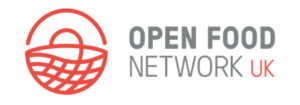
An international community of online, open source, ‘platform cooperatives’ linking thousands of local producers with consumers guided by principles of agroecology and the commons.
Name of organisation | Open Food Network |
|---|---|
Year established | 2014 |
Website | Open Food Network |
Location | United Kingdom / International |
Type of organisation | An online, open-source, not-for-profit platform cooperative |
Key words | Collaborative short food supply chain; Online food retail; Open-source software; Digital commons |
Thematic focus | Digital technology | Accessibility & Social Equity |
Who makes up the Open Food Network?
The Open Food Network (OFN) is a software-based ‘platform cooperative’, linking together small-scale food producers, processors, retailers and food hubs in the UK. Their nationwide network of ‘online shopfronts’ currently connect almost 2000 producers with around 10,000 food shoppers, providing a vital, convenient and low-cost option for local and agroecological food producers across the UK.
As well as providing a vital non-profit service for UK producers, the OFN also understands itself to be a learning community, offering multiple opportunities for UK food producers and retailers to share experiences and problem-solve collectively to strengthen the networks and movements in community food systems. Relatedly, the OFN also offers numerous resources and mentorship opportunities in terms of business planning support, community engagement, marketing, and partnership building in local food contexts. Finally, a big part of OFN’s operations includes data and research, especially in terms of building the evidence base for short supply chains and community-driven food systems.
Who do the OFN work with and how do they do it?
Though the OFN UK is run autonomously, the OFN also fits within a global Open Food Network – a federated network of OFN chapters based in 21 countries across the world. This network works together to develop new software, online tools and ways of working which collectively nourish the community as a whole. This means developing shared resources, knowledge and software to support better food systems. The main mechanism to achieve this involves the collaborative development of open-source code and software, meaning that – provided it is not being used for profit and fits with the values of the network – anyone can use the platform and the underlying code as they wish. The benefits of this collaborative way of working include the reach of the network, as all around the world, we get more than we could possibly create on our own.
This system draws on the input of not just paid staff but also volunteers. This means that the OFN goes beyond its relatively small budget to draw on the expertise of the vast community of open-source software development and food activists. Their input and skills enable us to create an elegant system of voluntary and collaborative task distribution, which is made possible by the way in which the OFN platform is designed.
What are the OFN’s main challenges?
The OFN is a relatively young organization and is still developing links with many key stakeholders. During the COACH campfire event in October 2021 a number of stakeholders were identified as having a simultaneously ‘weak’ link to the OFN network while also being seen as relevant to the food and farming ecosystem of which the OFN is a part. Of particular focus within this were people on low incomes and People of colour, two groups which have historically been hard to reach for local food producers and retailers.
The impact of Covid-19 on the OFN was huge. In the seven weeks following the announcement of the national lockdown in the UK (March 23rd 2020) sales on the platform increased by 1000%. It has since levelled off to 750%, but, nonetheless, it has put a huge strain on the organisation while simultaneously demonstrating the latent demand for localised short food supply chains, especially those with an explicit social and environmental mission. It is a key part of the OFN’s work in the coming years to find ways to build resilience into their current systems and ways of working to ensure OFN can adapt to future challenges
What are the priorities for the OFN?
A key area currently being worked on by the OFN community is the idea of ‘data interoperability’ and specifically the development of a public ‘open standard’. This would mean all the emergent network of open-source and non-profit software platforms could be linked together without sacrificing their diversity and autonomy. If this were agreed upon, the efficiency and reach of this emergent network would be dramatically increased.
A huge part of how OFN views its future in this regard is in terms of network building. In particular, when access to capital and funds is minimal, building community around digital innovations is important to maximise their impact and effectiveness:
“we’ve really realised that an important part of building open source software is building the community around it. You know, we can’t pay what Amazon pay the developers. So part of it is around that kind of community of practice and the passion that people bring, but we also recognise that people need livelihoods […] We can’t aggressively acquire users like other platforms can”. (Lynne Davis – OFN UK)
To this end, in the last year the OFN has started collaborating with the Data Food Consortium. which is a collective aiming to co-create a common digital language to pool data and connect local food actors and initiatives. They have been running webinars, and ultimately working towards an open public standard. For more information about this aspect of the OFN’s work, see the DFC website and to set up something similar in the UK.